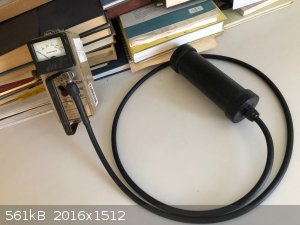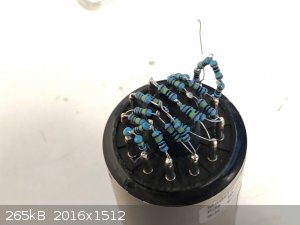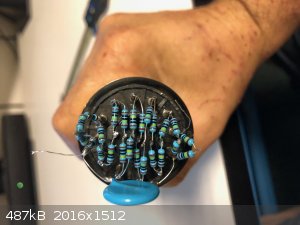
1KEE - 17-10-2020 at 11:05
My buddy recently got a brachytherapy implant in his prostate. He was probably surprised by my level of excitement about it lol... I asked him if they
were going to remove the implant, and he said no, so I figured it's a short lived isotope and I don't have much time to take advantage of the
situation.
I have a Ludlum model 12 survey meter, which works good, and some questionable NaI(Tl) probe inserts (the scintillation crystal and photo-multiplier
in a metal housing with no socket or divider network). I cobbled together a resistor network directly soldered to the back of the PMT, and stuck it
inside an ABS pipe housing. Here's a video of the first experiment.
https://www.youtube.com/watch?v=IqFr77aqNH4
The Ludlum 12 is in the X100 range in the video. The reading at 4 feet away is past 500 CPM X 100, pegged. At about 20' away I can detect the
direction the radiation is coming from, but the reading is not much over background. For comparison, a WWII era aircraft gauge with Radium paint,
applied directly to the front of the probe, produces a similar reading of > 500 CPM X100.
This is quite a potent source! I'd like to study it further... figuring out the half life should be easy. Identifying the isotope and it's activity
level in curies would be fun.
I'm guessing the probe is 1.5" x 0.100" or X 0.200" NaI(Tl). Not the most ideal for higher energy gammas, but probably perfect for this source. It is
a fairly sensitive probe compared to a GM.
Quick research on prostate brachytherapy mentions the following:
I125 (60 days, 27Kev gamma peak)
Pd103 (17 days, 23Kev gamma peak)
Cs131 (9.7 days, 29Kev gamma peak)
https://www.ncbi.nlm.nih.gov/pmc/articles/PMC2807139/
I also have a Ludlum 2200 Scaler/Ratemeter/Single Channel Analyser, however that is a unit I have never used and might need some work. If I have time
this weekend I'll try to revive it.
Obviously an MCA would do the trick for identifying the isotope. For lack of an MCA, or any other reliable/calibrated instruments, I'm enjoying trying
to figure out how to take the best measurements possible with what I have.
To get a better idea of the activity level, I'm thinking I first need to calibrate the ranges on the Ludlum 12 so I can be more certain of the
measurements. A function generator connected to the Ludlum 12 though a capacitor should do the trick for that. Calibrating it against some known
sources would be nice. I wonder if the Am241 in a fresh smoke detector is a fairly accurate check source? The main gamma peak for Am241 is 59.6Kev, so
about double the energy level of the stuff I might be looking at, but reasonably close.
One other thing I'm wanting to do is find some lead roof flashing and wrap the probe to decrease the background noise and improve directionality.
morganbw - 17-10-2020 at 12:41
I may have misunderstood, I often do. Are you saying that your are going to be reading the radiation of your friend asshole? Also what purpose would
this serve?
1KEE - 17-10-2020 at 13:14
>> Are you saying that your are going to be reading the radiation of your friend asshole?
Hahah fortunately for both me and the rectum in question, I can detect the radiation from far away. When I first mentioned my inentions to my friend,
and showed him the photos of the device and the probe, he might have been concerned. It if pretty large in diameter :-)

But yeah, lucky for his asshole, the scintillation probe gives a nice reading from far away.
>> Also what purpose would this serve?
Well, it's a great way to entertain myself with a radiation source different and more exciting than the "normal" Ra226 glow in the dark dials, Am241
smoke detectors and Uranium or Thorium ore samples I collect.
I'd really like to be able to identify the isotope and original activity level, and then ask my buddy's doctor how accurate my determination of that
is. I'm not sure if I'll get there with the equipment I have. Total investment here is under $100 so far.
BTW here's photos of the resistor divider network on the back of the PMT. I got the Ludlum 12 from Ebay for like $50, great deal. The PMT scint probe
insert was a freebie, basically dumpster diving find.


